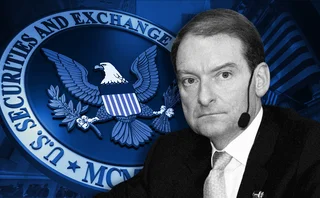
Lynch amendment spooks DTCC

As dealers and legislators debate reform of the over-the-counter derivatives market, at least one innocent bystander - the New York-based Depository Trust & Clearing Corporation (DTCC) - has been caught in the crossfire. At the end of February, DTCC staff travelled to Washington, DC to voice their concerns.
At issue is an amendment offered by Massachusetts congressman Stephen Lynch on December 9, which was included in the House version of reform, the Wall Street Reform and Consumer Protection Act, when it passed two days later. The rule would prevent dealers from collectively owning more than 20% of any derivatives clearing house - an attempt to stop the industry from hampering progress towards greater use of clearing and a swipe at dealer-backed ventures such as IntercontinentalExchange's Ice Trust and Ice Clear Europe. But it could also catch the DTCC, which regularly shakes up its ownership based on how much members use its services. If one of these periodic reviews resulted in more than a fifth of the DTCC's shares being in the hands of dealers, the consequences could be dire.
"It's impossible to know what would happen," says a US-based source. "DTCC shares are not publicly traded so it might theoretically mean it has to go public and then completely rebalance the ownership. But the DTCC is also a monopoly, which is only tolerated because it is a user-owned utility, so going public would leave it subject to the usual antitrust laws. To say it's a catch-22 would be an understatement. In theory, it could prevent it fulfilling its charter and put it out of business."
One London-based banker is sympathetic. "It's a technical thing, but it's a real pain for them. It's one thing having a go at banks, but the consequence of this amendment is it's now sweeping up a utility as well," he says. A spokesman for the DTCC confirms that concerns have been raised in Washington, but refuses to comment further.
The Lynch amendment specifies that dealer ownership would be restricted only for a "derivatives clearing organisation that clears swaps", which would seem to rule the DTCC out - although it clears a vast swath of the cash markets, it doesn't at this point handle swaps business. That apparent exemption hasn't been enough to calm the DTCC's fears, though.
It's a real pain for them. It's one thing having a go at banks but the consequence of this amendment is that it's now sweeping up a utility as well
The point could eventually be rendered moot. The impression gathered on the DTCC's Washington trip is that the Lynch amendment has few backers in the Senate, where three different committees are currently drawing up their own reform bills - which will need to be compressed into a single document before finally being reconciled with the House version. If none of the Senate proposals contain a Lynch-type rule, it would be more difficult for the amendment's backers to force it into the final reconciled bill.
"It's tough to say anything definitive, but people are saying there doesn't appear to be a champion. There isn't anyone out there saying ‘I want this to take place, I want this Lynch language'," says the US-based source.
Until the final bill appears, however, the uncertainty remains - and the notion of restricting dealer ownership of clearing houses has its supporters. Across the Atlantic, an advisory note published on February 11 contains even stronger language than the Lynch amendment, calling for dealers to be barred from sponsoring clearers. The note is for politicians who will vote on the European Union's own OTC reforms. On March 1, Moody's Investors Service released a report that argued the ban on dealer ownership would help tackle systemic risk by making it less likely clearers would compete for business by reducing margin requirements.
Only users who have a paid subscription or are part of a corporate subscription are able to print or copy content.
To access these options, along with all other subscription benefits, please contact info@risk.net or view our subscription options here: http://subscriptions.risk.net/subscribe
You are currently unable to print this content. Please contact info@risk.net to find out more.
You are currently unable to copy this content. Please contact info@risk.net to find out more.
Copyright Infopro Digital Limited. All rights reserved.
As outlined in our terms and conditions, https://www.infopro-digital.com/terms-and-conditions/subscriptions/ (point 2.4), printing is limited to a single copy.
If you would like to purchase additional rights please email info@risk.net
Copyright Infopro Digital Limited. All rights reserved.
You may share this content using our article tools. As outlined in our terms and conditions, https://www.infopro-digital.com/terms-and-conditions/subscriptions/ (clause 2.4), an Authorised User may only make one copy of the materials for their own personal use. You must also comply with the restrictions in clause 2.5.
If you would like to purchase additional rights please email info@risk.net
More on Regulation
Looming US Basel endgame redraft sparks calls to save IRB
Experts say 20 years of data makes credit risk models more appropriate than standardised approach
Cool heads must guide financial regulation of climate risk
Supervisors can’t simply rely on ‘magical thinking’ of market discipline, says Sergio Scandizzo
Markets worry EU’s reporting simplification will add to burden
Rather than reducing firms’ obligations, market participants fear it could end up increasing requirements
EU banks show basic instinct for credit valuation adjustments
Simpler approach to CVA appeals even to some already using more complex models for counterparty risk
Bank of England wants dynamic Emir for UK clearing houses
Review won’t just photocopy EU legislation, as BoE seeks to make rules simpler and adaptable
Big banks could be sidelined from future rescue deals – FSB
Exacerbation of too-big-to-fail means G-Sibs could already be too large to take extra assets
More guidance, less enforcement: the SEC under Paul Atkins
Current and former insiders expect clearer crypto rules and an end to regulatory violation sweeps
During Trump turbulence, value-at-risk may go pop
Trading risk models have been trained in quiet markets, and volatility is now looming








